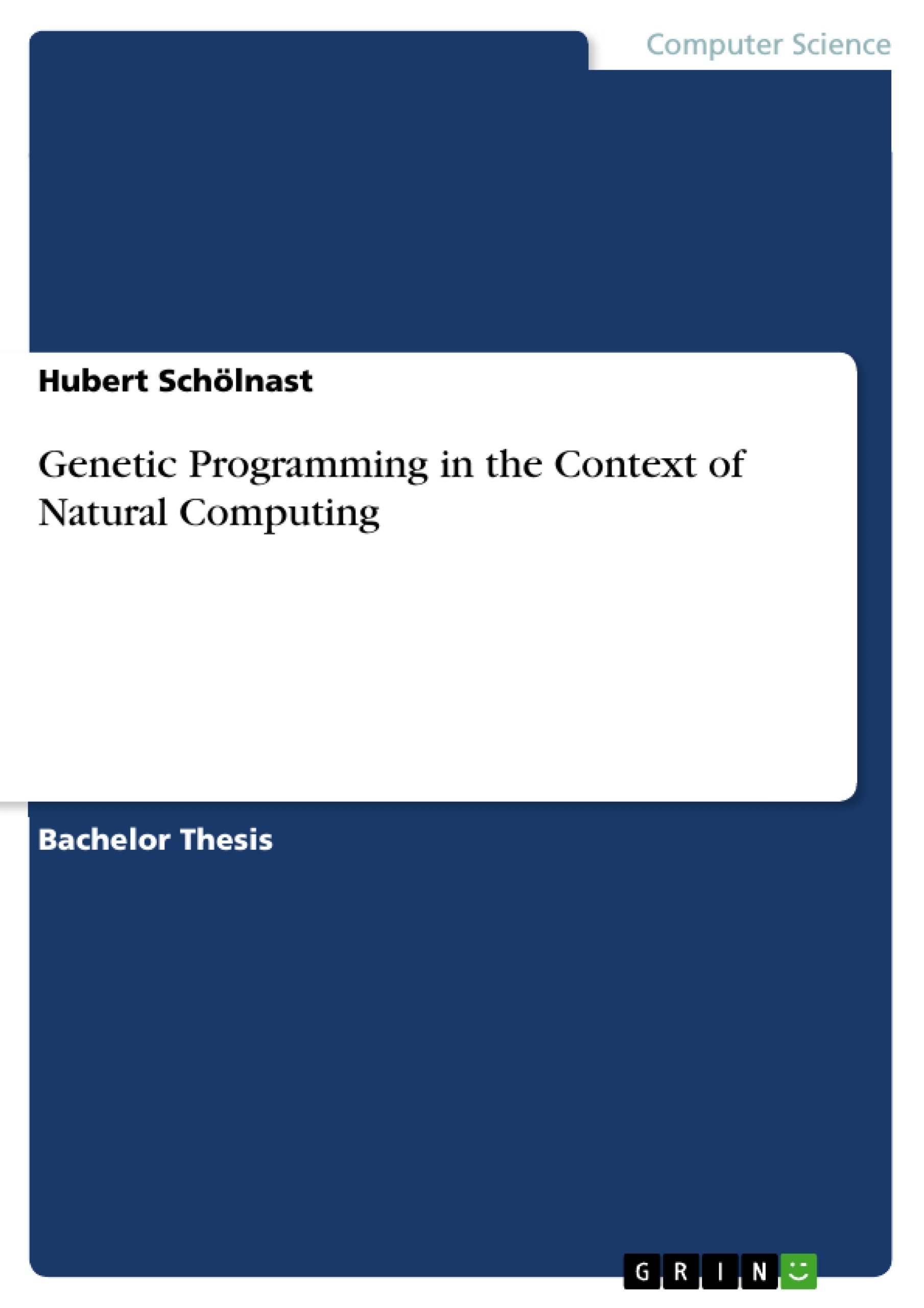From the sector “Natural Computing” (simulation of natural Phenomena, hardware from nature, nature borrowed methods, etc.), the area “Biological inspired Computing” is selected and described.
A systematic literature analysis of this field of research over the past 30 years shows that after a boom in neural networks in the 1990s, in the last five years genetic algorithms, including particularly the methods of genetic programming, came to the foreground.
In this heuristic procedure computer programs are optimized in an iterative loop. In the startup phase, programs will be randomly generated. In a frequently recurring cycle, the steps program execution, evaluation of results (determination of fitness); selection and diversification (especially crossover and mutation) are used to “grow” better programs from generation to generation.
This work shows criteria to decide in favor of whether or not to use genetic programming. Proven and experimental methods are presented for all phases of the optimization process, and one will find a short survey on how far these methods correlate to their natural role model. This thesis also refers to common problems such as Bloat.
A library of methods collected by the author forms a mixture of a cookbook and a toolbox to be used in Genetic Programming.
Finally, this thesis provides some examples where with the help of genetic programming award-winning practical applications have been created, which in many cases have outperformed conventionally obtained results.
Inhaltsverzeichnis (Table of Contents)
- Einleitung (Introduction)
- Was ist „Wissensgesellschaft“? (What is a "Knowledge Society"?)
- Eine neue Phase der Menschheitsgeschichte (A New Phase in Human History)
- Wissenschaft und Politik in der Wissensgesellschaft (Science and Politics in the Knowledge Society)
- Wissenschaft, Technologie und Innovation (Science, Technology, and Innovation)
- Vom „Technologischen Determinismus“ zur „Social Shaping of Technology“ (From "Technological Determinism" to "Social Shaping of Technology")
- Die Rolle der Wissenschaft in der Innovation (The Role of Science in Innovation)
- Wissenschaftliche Politikberatung (Scientific Policy Advice)
- Politik und Gesellschaft im Wandel (Politics and Society in Transition)
- Demokratisierung und Partizipation (Democratization and Participation)
- Neue Formen der Politikgestaltung (New Forms of Policy Making)
- Die Herausforderung der Globalisierung (The Challenge of Globalization)
- Die Zukunft der Wissensgesellschaft (The Future of the Knowledge Society)
Zielsetzung und Themenschwerpunkte (Objectives and Key Themes)
This work aims to provide a comprehensive overview of the concept of the "Knowledge Society" and its implications for science, politics, and society. It explores the changing role of science and technology in a globalized world and discusses the challenges and opportunities of shaping a future where knowledge is a central driving force. Key themes discussed in the text include:- The concept of the "Knowledge Society" and its historical and social context
- The relationship between science, technology, and innovation
- The impact of globalization on politics and society
- The role of scientific policy advice in shaping the future
- The challenges and opportunities of democratization and participation in the Knowledge Society
Zusammenfassung der Kapitel (Chapter Summaries)
- Einleitung (Introduction): This chapter introduces the concept of the "Knowledge Society" and its historical context. It argues that we are living in a new phase of human history where knowledge is a key factor driving social and economic development. It also discusses the changing relationship between science and politics in this new context.
- Wissenschaft, Technologie und Innovation (Science, Technology, and Innovation): This chapter examines the relationship between science, technology, and innovation in the Knowledge Society. It explores the evolution of thinking on the impact of technology on society, from "Technological Determinism" to "Social Shaping of Technology." The chapter highlights the role of science in driving innovation and explores the importance of scientific policy advice.
- Politik und Gesellschaft im Wandel (Politics and Society in Transition): This chapter focuses on the impact of the Knowledge Society on politics and society. It examines the increasing importance of democratization and participation and explores new forms of policy making in a globalized world. The chapter also discusses the challenges of managing globalization and its implications for national and international politics.
Schlüsselwörter (Keywords)
This text focuses on the concept of the "Knowledge Society," its historical and social context, and its implications for science, technology, innovation, politics, and society. Key terms and concepts include: "Knowledge Society," "Technological Determinism," "Social Shaping of Technology," "Innovation," "Scientific Policy Advice," "Globalization," "Democratization," "Participation," and "New Forms of Policy Making."Frequently Asked Questions
What is the concept of a "Knowledge Society"?
It describes a phase in human history where knowledge is the central driving force for social and economic development, changing the relationship between science, politics, and the public.
What is "Genetic Programming"?
Genetic Programming is a heuristic method where computer programs are optimized in an iterative loop using biological principles like crossover, mutation, and selection to "grow" better solutions.
What is "Social Shaping of Technology"?
It is a perspective that argues technology does not develop independently (technological determinism) but is shaped by social, political, and economic factors.
What does the term "Bloat" mean in Genetic Programming?
Bloat refers to a common problem where programs grow in size over generations without improving their fitness, leading to inefficiency.
How does globalization affect the Knowledge Society?
Globalization challenges national politics and requires new forms of policy-making and increased international cooperation in science and technology.
- Arbeit zitieren
- Hubert Schölnast (Autor:in), 2009, Genetic Programming in the Context of Natural Computing, München, GRIN Verlag, https://www.grin.com/document/148852



